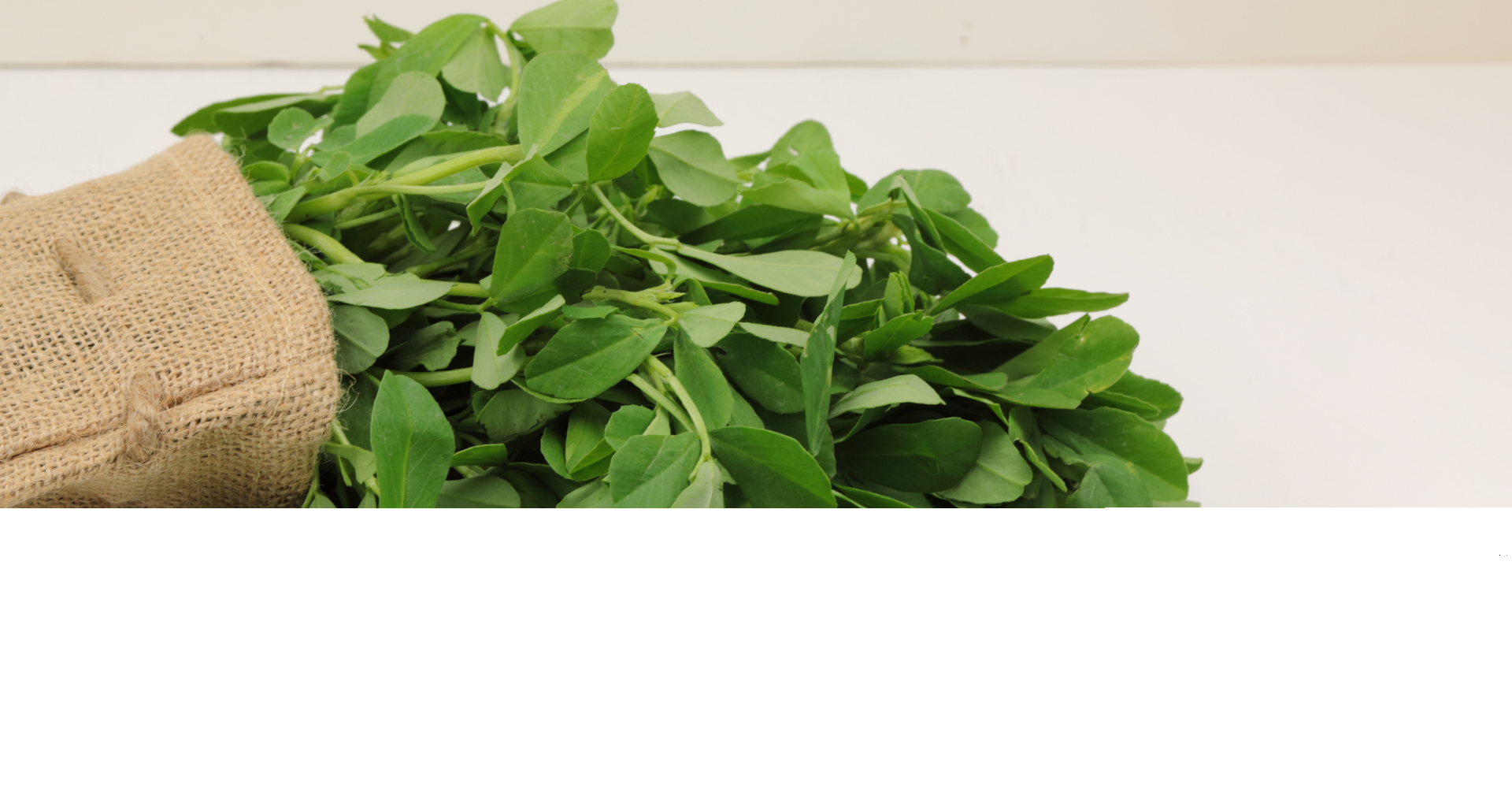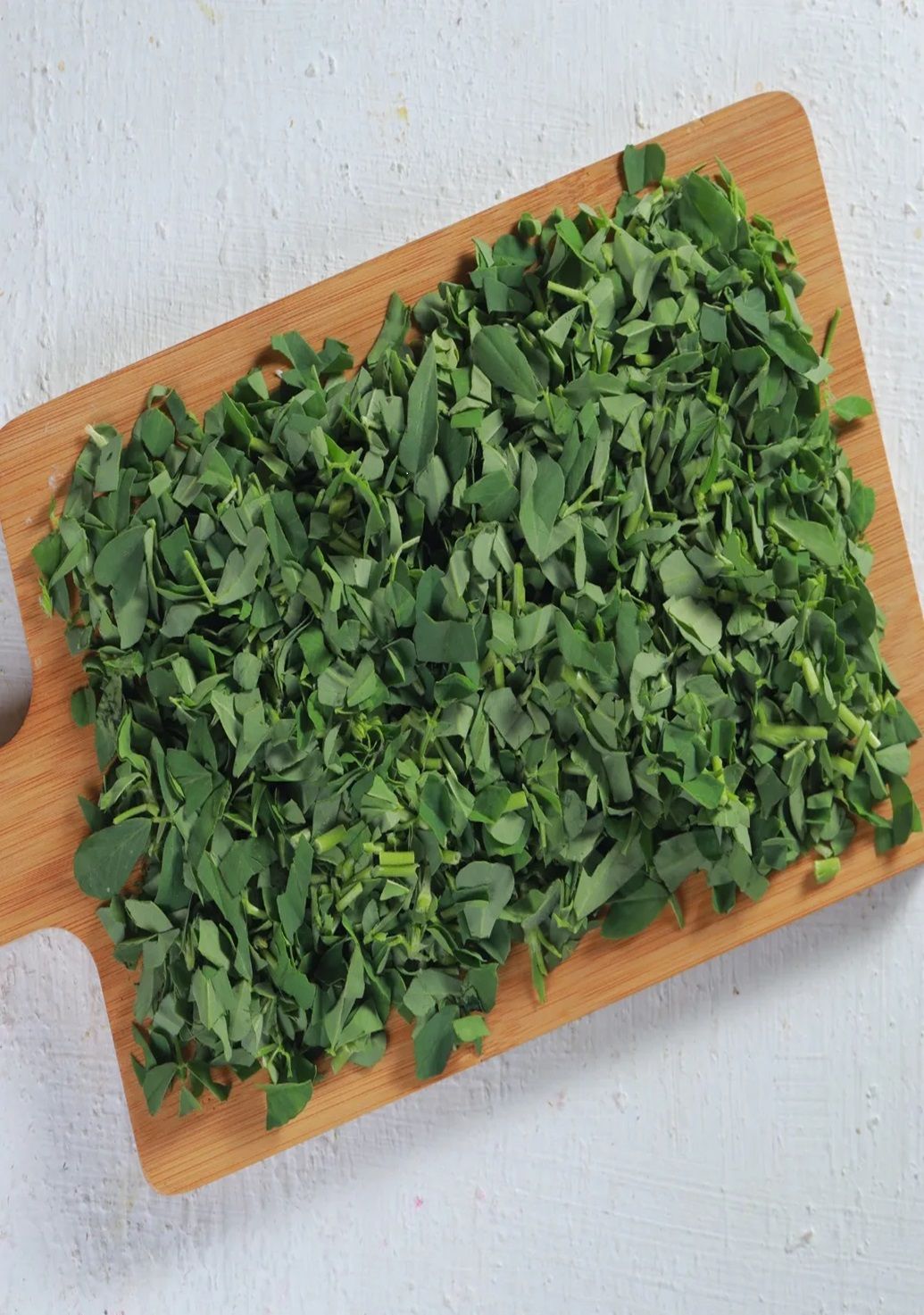
For a better and faster shopping experience, download app
Unkown

10 Impressive Health Benefits of Methi (Fenugreek Leaves)
Methi, or fenugreek leaves, is a staple in Indian kitchens—known not just for its slightly bitter, earthy flavor but also for its incredible nutritional value. Used in dals, curries, parathas, and even herbal remedies, methi has been a part of traditional Indian diets and Ayurvedic medicine for centuries.
While methi seeds often get attention, the fresh green leaves are a powerhouse in their own right—rich in fiber, antioxidants, iron, and plant compounds that support everything from blood sugar control to hair health. Let’s explore 10 science-backed benefits of methi that make it a super green worth adding to your plate.
1. Rich in Essential Nutrients
A 100-gram serving of fresh methi leaves offers:
- Calories: 43
- Iron: 1.9 mg
- Fiber: 3.5 g
- Vitamin C: 52 mg
- Vitamin A: 700 IU
- Calcium: 395 mg
How These Nutrients Help:
- Iron: Helps prevent anemia and supports energy levels
- Vitamin C: Boosts immunity and aids iron absorption
- Calcium & Vitamin A: Support bone strength and vision
- Fiber: Keeps your digestive system healthy and supports weight loss
2. Controls Blood Sugar Levels
Methi is well-known for its ability to manage blood sugar—especially helpful for people with diabetes or insulin resistance. The soluble fiber in methi slows the absorption of sugar in the bloodstream.
Regular consumption of methi leaves has been shown to:
- Improve insulin sensitivity
- Lower fasting and post-meal blood sugar
- Help prevent sugar spikes after meals
You can sauté methi leaves with garlic and turmeric for a diabetic-friendly side dish.
3. Boosts Digestion and Gut Health
Thanks to its high fiber content, methi helps maintain a healthy gut. It supports regular bowel movements and prevents constipation. Its mild bitterness stimulates bile production, which aids digestion and fat metabolism.
Eating methi regularly can also reduce bloating and gas, making it an excellent digestive tonic.
4. Supports Weight Management
If you're trying to lose weight or manage your appetite, methi can be your ally. The fiber in methi expands in your stomach, helping you feel full for longer. This reduces overeating and helps curb cravings between meals.
Add methi leaves to soups, lentils, or make methi parathas with whole wheat for a filling, fiber-rich meal.
5. Improves Heart Health
Methi’s ability to manage cholesterol is one of its most powerful benefits. The saponins and fiber in the leaves help reduce LDL (bad cholesterol) while maintaining healthy HDL levels.
Regular intake can also help regulate blood pressure thanks to its potassium content and anti-inflammatory properties.
6. Great for Skin and Hair
Methi has long been used in traditional beauty remedies—and for good reason. The antioxidants and vitamin C in methi support collagen production, promoting healthy, glowing skin. Its anti-inflammatory effects may help manage acne and dullness.
Methi also strengthens hair follicles and reduces hair fall. Many people use methi-infused oils or apply methi paste to their scalp for dandruff control.
7. Helps Fight Inflammation
The compounds in methi leaves—such as diosgenin and flavonoids—have strong anti-inflammatory effects. This can help reduce internal inflammation, which plays a role in many chronic conditions, including arthritis, metabolic syndrome, and even fatigue.
Sautéed methi with garlic is a natural anti-inflammatory side dish to include regularly.
8. Boosts Iron and Fights Fatigue
Iron deficiency is one of the most common causes of fatigue, especially in women. Methi is a natural plant-based source of iron, making it an excellent addition for those needing an iron boost.
Pairing methi with vitamin C-rich foods like lemon or tomatoes can increase iron absorption even more.
9. Supports Lactation in New Mothers
Methi is widely recommended in Indian households for breastfeeding mothers. It helps stimulate milk production naturally, thanks to plant compounds that mimic estrogen-like activity.
Many women consume methi leaves as part of postnatal meals or include it in laddoos and sabzis.
10. Helps Maintain Hormonal Balance
Methi has adaptogenic properties, meaning it helps your body manage stress and hormonal imbalances. Some studies suggest it may reduce PMS symptoms and support reproductive health in women.
It’s often included in Ayurvedic treatments for PCOS and irregular menstrual cycles.
Conclusion
Methi leaves are more than just a flavor booster in Indian cooking—they are a medicinal green packed with nutrients that support your entire body. From managing blood sugar and cholesterol to boosting skin health and supporting digestion, methi truly earns its place as a superfood.
Affordable, versatile, and deeply rooted in Indian food traditions, methi leaves can be added to parathas, curries, dals, or even soups and smoothies. Whether you’re focused on wellness, weight loss, or simply adding more greens to your plate, methi delivers a wide range of benefits without much effort.
Next time you're at your local market, don’t forget to pick up a bunch of fresh methi and unlock its powerful health perks—your body will thank you.
FAQs
Q: Can methi leaves help lower cholesterol?
A: Yes, methi contains fiber and saponins that help reduce LDL (bad cholesterol) and support heart health.
Q: Are methi leaves good for diabetes?
A: Absolutely. Methi slows sugar absorption and helps regulate blood sugar levels naturally.
Q: Can I eat methi every day?
A: Yes, fresh methi can be eaten regularly in cooked dishes. Start with small amounts if you’re new to it.
Q: How do I store fresh methi leaves?
A: Wash, dry, and store in an airtight container in the fridge. You can also chop and freeze it in portions.
Fresh leaves with a bitter-sweet, earthy flavour
- 250 Gms
- 500 Gms
₹31







![Fenugreek [Methi]img 3 Fenugreek [Methi]img 3](https://im.pluckk.in/unsafe/1035x0/uploads/new_sku_designs_v3/111011195AB/3.jpg)
![Fenugreek [Methi]img 1 Fenugreek [Methi]img 1](https://im.pluckk.in/unsafe/1032x0/uploads/new_sku_designs_v3/111011195AB/1.jpg)
![Fenugreek [Methi]img 2 Fenugreek [Methi]img 2](https://im.pluckk.in/unsafe/1032x0/uploads/new_sku_designs_v3/111011195AB/2.jpg)



